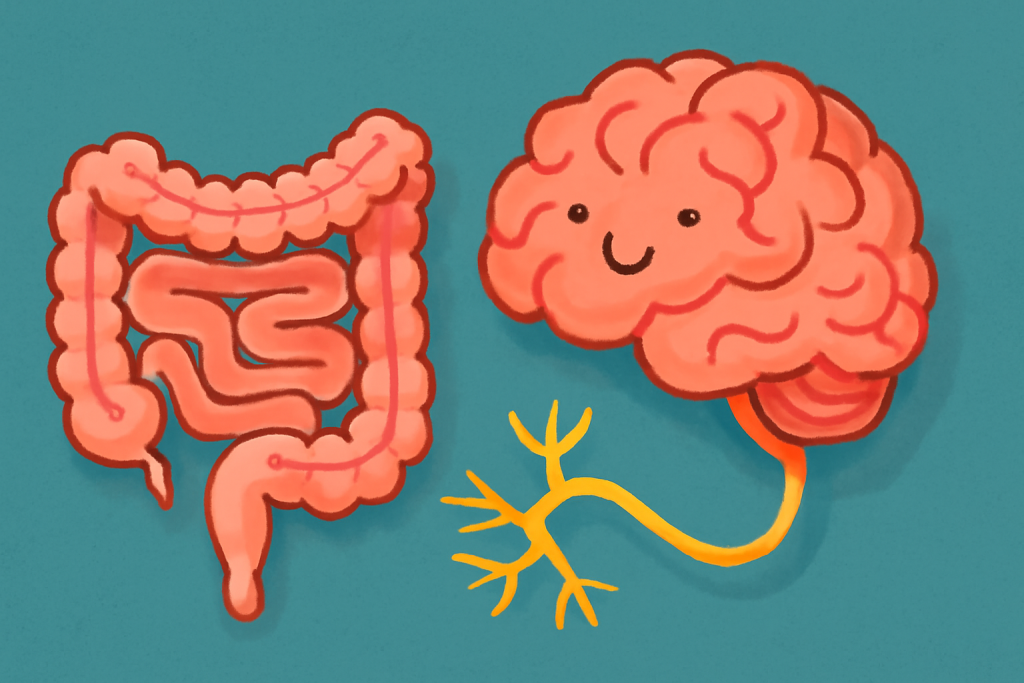The connection between gut health and mental well-being is rapidly gaining attention in the wellness and medical communities. Recent studies suggest that what’s happening in your digestive system may significantly impact your mood, behavior, and overall mental health. In this article, we’ll explore the science behind this fascinating link and why it’s considered one of the most exciting emerging trends in health.

Understanding the Gut-Brain Axis
The gut-brain axis refers to the communication network between the gastrointestinal system and the brain. This involves both neural and chemical signals. The vagus nerve is crucial in this process, acting as the main communication route between the gut and the brain.
Studies reveal that gut bacteria influence the brain. For example, beneficial bacteria produce neurotransmitters like serotonin, which plays a role in mood regulation. In fact, about 90% of serotonin is produced in the gut. Disruptions in the gut microbiome can lead to mood problems, including anxiety and depression (Smith et al., 2020).
How Diet Affects Gut Health and Mood
What you eat has a direct effect on your gut health and, consequently, your mood. A balanced diet filled with fiber, prebiotics, and fermented foods helps nurture healthy gut bacteria. On the other hand, consuming high amounts of sugar and fat can harm this delicate balance, potentially leading to negative emotions and mental states (Müller et al., 2021).
For instance, omega-3 fatty acids found in fish and flaxseeds promote the growth of bacteria that reduce inflammation, which is linked to depression and anxiety (Patterson & Thiele, 2022). Fermented foods like yogurt, kimchi, and kombucha are rich in probiotics, beneficial bacteria that can improve mood by restoring gut balance.
The Role of Probiotics in Mental Health
Probiotics, the good bacteria found in foods and supplements, are proving to be beneficial for mental health. Research indicates that they can help manage conditions such as anxiety, depression, and even post-traumatic stress disorder (PTSD).
In 2021, a study found that after taking probiotics for eight weeks, participants experienced a significant reduction in depression and anxiety symptoms. The probiotics used in the study (Lactobacillus and Bifidobacterium strains) improved the gut’s microbial diversity and contributed to better mood regulation (Sandhu et al., 2021).
Gut Health’s Impact on Mental Health Disorders
Emerging research suggests that improving gut health may offer a new path for treating mental health conditions. For instance, a 2023 study found that people with depression tend to have an imbalanced gut microbiome compared to those without the condition. This imbalance suggests that gut health could play a major role in mental health management (Harrison et al., 2023).
Additionally, anxiety disorders are often associated with increased gut permeability or “leaky gut,” which allows harmful bacteria and toxins to enter the bloodstream. This leakage can lead to inflammation that affects the brain, worsening anxiety symptoms (Harrison et al., 2023).
How to Improve Gut Health for Better Mood
There are practical steps you can take to improve both your gut health and mood:
- Eat a Diverse Range of Foods: A varied diet with plenty of fruits, vegetables, and whole grains supports a healthy microbiome and promotes better mental health.
- Consume Probiotics and Prebiotics: Foods like yogurt, kefir, and fermented vegetables, as well as fiber-rich prebiotics, help nurture healthy bacteria in the gut.
- Cut Down on Processed Foods: High-sugar and fatty foods can disrupt the balance of gut bacteria, leading to mood imbalances.
- Exercise Regularly: Physical activity helps improve gut health by reducing inflammation and promoting beneficial bacteria.
- Manage Stress: Chronic stress can harm the gut microbiome. Practices like yoga, meditation, and deep breathing exercises help reduce stress and support a healthier gut.
Conclusion
The link between gut health and mood is a breakthrough in mental health research. It’s clear that optimizing gut health can play a significant role in improving mood and overall mental well-being. Future studies could reveal even more about how the gut microbiome influences mental health, potentially leading to new, more effective treatments.
References
Harrison, L. M., et al. (2023) ‘Gut permeability and anxiety: A modern perspective on gut-brain communication,’ Psychiatry Research 306, 114182.
Müller, P. D., et al. (2021) ‘The impact of diet on the gut microbiome and mental health,’ Journal of Nutritional Health & Food Engineering 9(3), 201-210.
Patterson, J. D., & Thiele, B. (2022) ‘Omega-3 fatty acids and gut bacteria: A link to depression and anxiety,’ Psychoneuroendocrinology 138, 105671.
Sandhu, K., et al. (2021) ‘Probiotics and mental health: An emerging relationship,’ Neuropsychopharmacology 46, 1994-2000.
Smith, R. E., et al. (2020) ‘The gut-brain axis and its influence on mood disorders: A review of the evidence,’ Neuroscience & Biobehavioral Reviews 108, 123-130.









